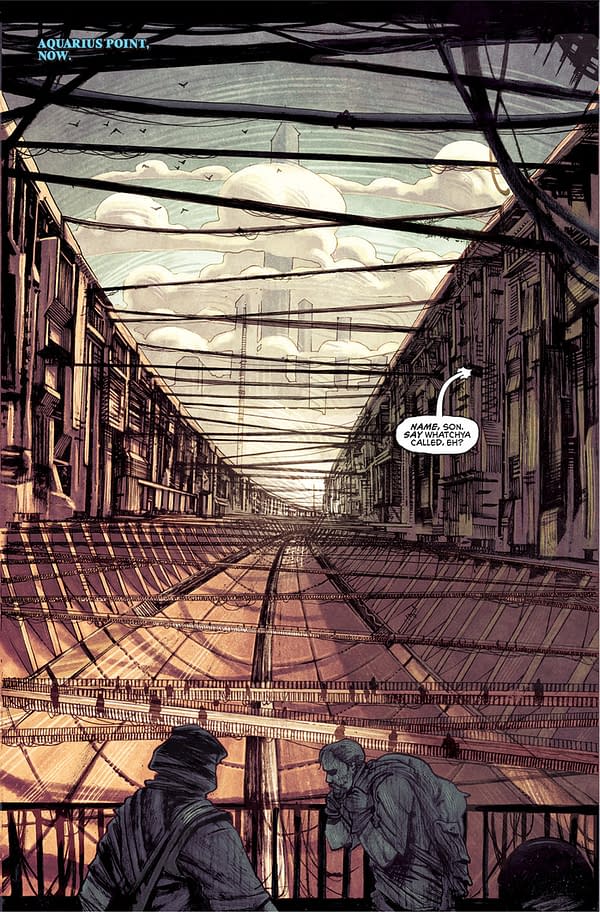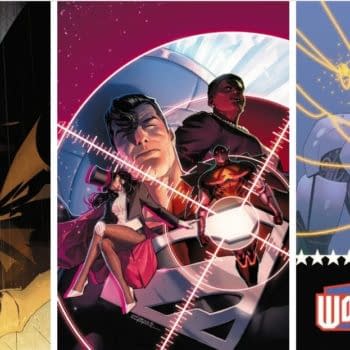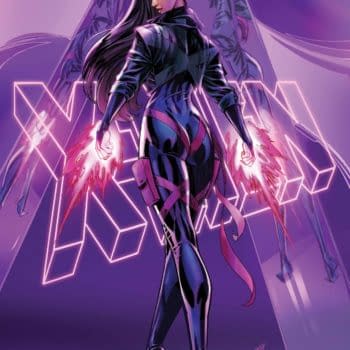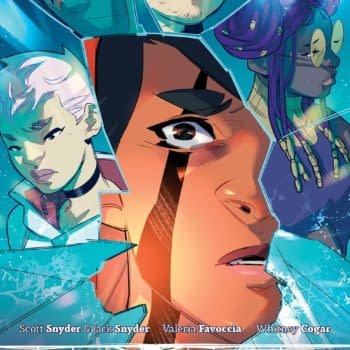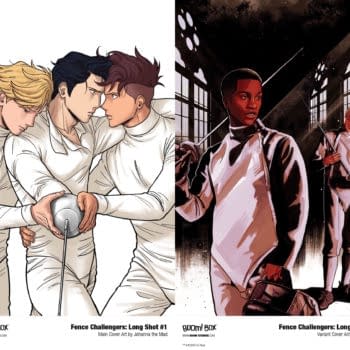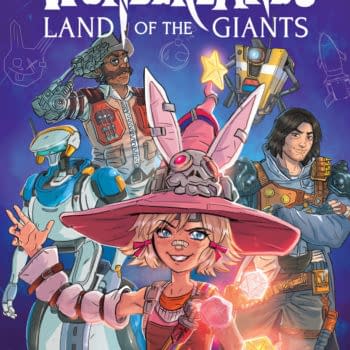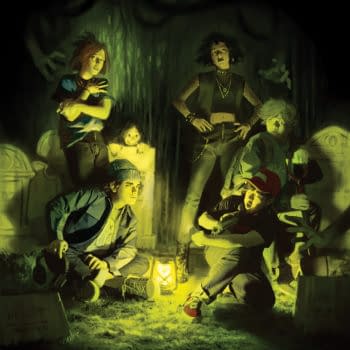Posted in: Comics | Tagged: Comics, HRL
"It Was 4 AM And Whiskey Was Involved": Ryan O'Sullivan And Ram V Talk Void Trip, Paradiso, And Image Comics
Ryan O'Sullivan and Ram V are two very different writers from the UK. They're both members of the London-based White Noise writers studio, and both of them have new comics coming out through Image Comics in November and December of this year. (Ryan being the writer of Void Trip, alongside illustrator Plaid Klaus, and Ram being the writer of Paradiso, alongside illustrator Devmalya Pramanik and colorist Dearbhla Kelly.)
Their conversation below talks about their new comics, their creative process, their influences, and what drew them to the comics medium.
Ram: So, Ryan, why Void Trip? Why this story? Why now?
O'Sullivan: Why now? It's what's on my mind. Until January of this year I had a regular old day job and, like everyone else, I felt like I was trapped in it. It's one of those things we always say to people who are unhappy in work "don't worry, it's like that for everyone". The idea being that it's okay to feel like you have no true agency or freedom in your life because everyone else feels the same way? THAT is supposed to be re-assuring? That we're all suffering together? What utter nonsense. Bukowski said it best: "They accepted what they was. This was the wisdom of the slave".
Life is incredibly short, and gets progressively more tragic as the things you care about slowly fade out of it: loved ones, your dreams, your own health, and, in the end, you. The idea that we should limit our freedoms for the sake of an existence that does nothing but take them away seems ludicrous. We work 8-12 hours a day. That's ridiculous. There's no nobility in that. There's no innate virtue in "hard work". And I think Void Trip is born from this idea. The dark comedy at the heart of the Book of Job. A story about the last two humans left alive, being chased through the galaxy by a Calvinistic Old Testament villain, whilst searching for a planet which is literally called Euphoria.
It seems weirdly autobiographical now I unpack it. Hmm. Hadn't thought of it like this until you asked the question. It's odd, isn't it? You get asked the same questions about your work over and over, and you unpack it a little more every time. So let me throw the same question back to you. If you had to summarize what Paradiso is about without relying on the old "x meets y" crosspitch, how would you define it?
Ram: You know how, when you walk into someone's home, you always have an impression of who they are? The way it's designed, their choices, their tastes. I find that interesting. A place that you've built and designed and lived in, says something about you. You could say the same thing of cities. With Paradiso, we made that city ask the question, 'Who am I?' And the answer lies as much in the city as it does in the people who inhabit it. So, it becomes a way of looking at the things that make us human.
Simpler answer? Imagine Sim City was being played by the city and the people living it in were having their lives manipulated so that the City could understand what it means to be alive.
This is the idea at the core of the story. Beyond that of course, there are cyborgs and sirens and malevolent fogs and talking mainframes and so much more.
O'Sullivan: Your last book, Brigands, was very much a fantasy epic. Would it be fair to say Paradiso is a sci-fi epic? Are you trying to conquer all of the genres?
Ram: Hah! I don't pay much attention to genres. They're convenient ways of stacking books in a book shop but beyond that, useless and often limiting as tools to a writer. Sure there was an era where you wrote to the genre and its expectations. There are so many excellent writers who've done that very well. But we're in the here and now. I believe good writing is blurring the boundaries between genres or using its expectations in interesting new ways. Or perhaps, it is saying that there are no boundaries. All the things I enjoy seem to be doing that increasingly.
As far as being an epic. Of course. Paradiso is grand in scale. A city of cities. And so, within her, there are many stories to tell. Many turns to explore. I know how the whole thing ends in my head. But there are so many places and people and things that'll surprise you in this city, before we come to it.
I'm interested to know when and how you first had the idea for Void Trip. Did you bring Plaid Klaus in right away?
O'Sullivan: Klaus and I worked on a webcomic-come-graphic novel last year called Turncoat. As we worked on it, he'd always do these little "warm up" sketches at the start of every day and post them online. One day he drew an astronaut next to a broken-down spaceship. The lil space dude was holding a sign, and was trying to hitch a lift from passing space ships. I took one look at that and the idea of doing a beat-generation counter-cultural sci-fi road trip story set in space seemed like a pretty obvious concept for our next book.
So yeah, Klaus was there from the start. Void Trip is very much a book we conceptualized together. With me plotting it out, and using him as a soundboard over and over again until we got something we were both happy with. I think this is probably my preferred method of working on a story. I don't especially like co-writing, but I do like co-creating. And Klaus, in the early stages of conceptualizing Void Trip, played the role that an editor typically would. In fact, the opening scene of the book, with Ana and Gabe stealing fuel from an alien, was entirely his idea.
How about yourself? The creative team you put together for Paradiso are incredible. Dev, Dearbhla, and Aditya work together so well you'd think they'd been working together for years. Er…have they? Tell me more about how you guys and gals all ended up working together on this. I WANT BACKSTORY!
Ram: It's a bit of a journey, this one. I've known Dev and Aditya from the indie comics scene back in India. We were all part of the same scene working with indie publishers. I had begun writing a comic called Aghori at the time. It garnered some attention and by the time I'd moved to the UK I was a fairly 'known' writer in Indian comics. Then around Thought Bubble 2015, where I first met you, Dan Watters and Caspar (Wijngaard) I had begun working on Black Mumba. I approached Dev to work on a couple of stories with me. One of the other artists (Rosh) had recommended Aditya for the lettering.
By 2016, Black Mumba was done. Dev, Aditya and I wanted to work on another book. I bounced the idea of Paradiso around and Dev was into it. We had everyone but the colorist onboard. I had previously worked with Alex Sollazzo on a few pitches and I loved his work so I asked him to color the pitch pages for Paradiso. But later when Image had picked the book up, Alex had scheduling issues and he needed to step out. I had begun to get to know people in UK comics by then and I had come across Dearbhla's work. I got in touch with her because her painted style was exactly what I was looking for. Alex handed over the coloring work to Dearbhla and man has she really made that coloring her own. You really can't tell where Dev's textural inks end and Dearbhla's textured/painted colors begin. It is quite something to watch.
I don't need to say much about Aditya, of course. The man is brilliant and rightly inundated with work. I think we enjoy working with each other and there's a lot of banter when we're working on books. I think that helps, to have a good relationship with the person who is putting your words down on the page. I'm incredibly lucky to have found these guys. An absolute pleasure working with them! Although it is not always easy.
O'Sullivan: Preaching to the choir, man. I'm new to writing comics. Turncoat was my first ever published comic and that only came out last year. Because of this I feel like I'm constantly writing at the edge of my ability. I like to think this will always be the case – we always want to get better, right? Well, yeah, but the downside is that I feel like the thing I'm striving to create never quite ends up being the thing I create. So, for me, the hardest part of making this book is accepting that I am constantly pushing against my own limits to make it as good as it can be, and to not let the fact I'm constantly reaching dampen my creative enthusiasm.
I don't get this with other comics I've worked on. Licensed work definitely pushes me ability-wise, but it doesn't emotionally cripple me in the same way Void Trip does. If I'm working on The Evil Within or Warhammer 40,000, or any of the other licensed things I've done for Titan Comics, I've always got the ideas/world/characters/tone of someone else's work to fall back on. (Of course, this comes with its own challenges, you need to know the lore of a given license in-depth if you're going to be any good at writing about it, but that's another article for another time.) But all of these books are for an already existing audience. With Void Trip, it's pretty much just me screaming into the abyss and hoping it echoes.
Licensed work makes me happy. Creator-owned work makes me miserable. But I still find both equally rewarding. It's an odd thing, isn't it. Writing, I mean. I've never given much thought to why I do it. Have we ever spoken about this? Why comics? What is it about the medium that draws us to it? I think you may have told me your thoughts on this once. But it was probably 4 a.m. and whiskey was involved. So my chances of remembering are slim.
Ram: It was 4 a.m. There was whiskey involved. I think we began by talking about the intersection of visual art and writing on the page. And it is really as simple as that. I enjoy that collaborative aspect of it. I know we have different views on this, but I believe making comics is a bit like playing a game of Rumors. What you're whispering into the artist's ear isn't necessarily what'll make it to the page. And I enjoy that. The intangible bits that happen between script and inks.
As a writer you want to be able to understand that and use it as a tool. So, I write, first, to excite/challenge/inspire my artist. I am telling him/her the story and they will present their understanding and vision of it to the reader– at least in terms of the visual information, the acting, the atmosphere. They might even add to it or change it. At that time the story takes on a life of its own. That thrills me and I hope to be able to use that alchemy of writing and art to maybe push what I can do with the medium.
O'Sullivan: Yeah, my approach to scripts is that they're instructional, art direction rather than inspiration for art. I couldn't work the way you do, but I definitely see the appeal in it. And I think your method of scripting bleeds into the final comic, too. I've always thought your comics tend to read more like, or at the very least draw more inspiration from, novels rather than western comics. Is this deliberate?
Ram: I think it is a consequence of how I started writing comics. As a kid, I read a lot of them. The superhero stuff, of course, but also a lot of Indian comics and then the old Phantom and Mandrake comics that were more prevalent, locally. Then after a while, I stopped. I was studying to be an engineer. Reading time was limited and I'd found novels. I read everything from pulp romance to science fiction to old-school sword and sorcery. Then somewhere in my mid-teens I found Steinbeck's Of Mice and Men. That book hit me like a ton of bricks. And when you find that experience in a book, you crave it again and again. It becomes harder to go back to the stuff that doesn't quite move the needle.
I got back into comics in my mid-twenties, really. A friend dropped Vol.1 of Sandman in my lap and I found that comics could do for me, the same thing that novels did. They could excite and affect me in ways that I hadn't thought possible. I devoured most of Gaiman, then found Alan Moore, then Morrison and Ellis and Ennis. And I think that's the point where I really began to want to write comics.
So, if my comics are influenced by novels more than western comics. It's probably because I walked away from comics for a really long time. I grew up mostly on prose stories and I think there is a lot to gain from that. Surely, to function within a medium, you must know it both, from the inside and the outside.
Plus you're not so different. I know Bukowki was a huge inspiration for Void Trip, right?
O'Sullivan: Hah! I'm glad you noticed that! There's other influences, Hunter S. Thompson, Kerouac, Melville, and McCarthy being the most obvious ones. But I'd have to say Bukowski was the main voice in my ear when I was putting together Void Trip.
I think the most obvious influence in Void Trip is in the design of Gabe. He's heavily inspired by Bukowski, visually. But beyond this, I'd have to say Bukowski's brutal honesty is something that shows its head time and time again throughout Void Trip. I'm a fan of novels that connect us to hard truths that we hadn't considered before. Ideas or perspectives that cut through polite society and point to the core of what's really going on. That's why I'm such an avid reader of Bukowski. Yes, he's misogynist, but he's also honest. He shows how terrible the world is, and how terrible he is, but not necessarily as a consequence of the world being terrible. And I think this ideology bleeds into Void Trip. Yes, the story is full of daft humour, but it does that to help counter/make palatable the absolute pessimism at the core of it. The chief idea being that, no matter how much we try to be free, we will always be held back by the universe around us. Bukowski accepted his lot in life, and was happy to roll around in the muck. To a large extent Gabe is the same. But Ana, our true lead, isn't. It's her reacting against Gabe's Bukowski-esque worldview that pretty much drives the dynamic of their relationship, and much of the narrative as a whole. She's taken one look at the universe, and decided it's not good enough.
Actually, speaking of novels. I feel like I sensed a bit of Calvino's Invisible Cities in parts of Paradiso. Did his work inspire you? Actually, better question, who's work did inspire you when you wrote Paradiso?
Ram: There's a bit of Calvino in there. But also a bit of Meilville and bits of both Lang and Tezuka's versions of Metropolis. You also have to remember, I began developing the idea with my good friend and architect Rajiv Bhakat and so his influences and his knowledge of urban spaces also forms a great part of what you see in the comic.
Is there a Calvino influence? Of course. I am fascinated by the idea that every city described in the book is still only a version of Venice. I like that. A space, a city can be very distinct things to different people, at different times. I think you'll see that a lot in the comics. Paradiso is a city, but constantly changing, re-shaping into new versions of herself. A setting for a story that is a constant and yet full of impermanence.
One piece of advice to Ryan O'Sullivan writing his first comic?
O'Sullivan: There's more to life than comics. I know right now you think this is all that matters. That you need Turncoat out so you'll do anything you can to make it work. But don't lose friends, lovers, and money just to make the comics dream happen. It'll happen, possibly, but what's the point of success if you've got no-one to share it with? Leave the house, Ryan.
Oh and burn that Robert McKee book for f-ck's sake.



